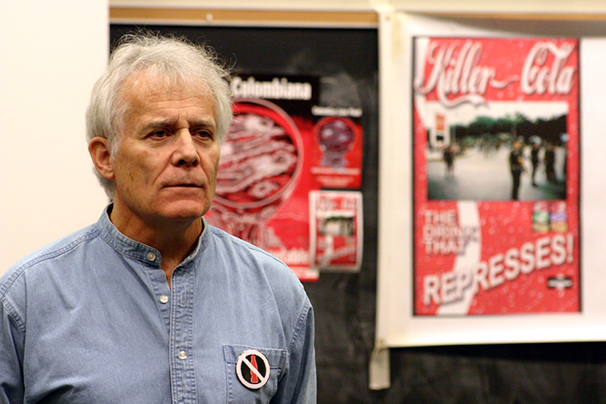
Five years after NYU lifted its ban on Coca-Cola products, union activist and Corporate Campaign, Inc. director Ray Rogers brings the debate over the soft drink company’s labor practices back into the public eye. Rogers sent a letter and a critical pamphlet to 130 university administrators last week, imploring them to reinstate the ban on Coke products.
“We are reaching out to you hoping that NYU will do the right thing again and remove all Coke vending machines and products from campus facilities,” Rogers said in the letter.
Rogers said the ban, which lasted from 2005 to 2009, was placed due to accusations that Coke was committing human rights violations in Colombia. He said the embargo was lifted prematurely and at the behest of those with interests in Coke’s profit margin in both his recent letter and on his website, Killer Coke.
Specifically Rogers said, Arthur Tannenbaum, the University Senate member who introduced the resolution lifting the ban, attempted to protect the interests of Coke and Barry Diller, a member of both the Board of Coke and the NYU Board of Trustees.
NYU spokesman Philip Lentz refuted these claims. Lentz said the decision to lift the ban was based on the corporation’s submitting to the demands made when the ban was issued.
“[The] University Senate revisited the issue in 2009 and lifted the ban after Coke agreed to an independent assessment of its labor relations in Colombia by the International Labor Organization,” Lentz said. “The information distributed by KillerCoke.org strongly mischaracterizes how these decisions were made.”
Tannenbaum also responded to the allegations and said financial gain played no part in his decision to introduce the resolution.
“I had no reason or stake in protecting Coca-Cola and never met Mr. Diller,” Tannenbaum said. “I didn’t know he was on the board at that time. My only objective was to be fair and impartial to all parties. The senate made the decision both times.”
Justin Lee, the chair of the Student Senators Council in 2009, said at the time that the decision to lift the ban, which passed 28 to 22, was somewhat disappointing to those who had supported the embargo. In a WSN article published on Feb. 9, 2009, Lee said people in the council who lifted the ban were tired of extensively talking about the issue and felt the ILO report was the best report they would receive. Lee said if there had been another independent investigation, then the council may not have settled for the ILO’s report.
Some supporters, including Rogers, were disappointed NYU lifted the ban because the ILO investigation did not address the accusations that Coke was linked to the killing of Colombian union leaders in the 1990s. Rogers said statements made by Coke executives suggested these murders would be a part of the ILO investigation.
GLS sophomore Ashley Slater said this discussion is closely tied to money.
“If the ban was enforced once again, who’s to say that NYU won’t just lift it after a couple of years when they believe the clamor of the event has died down and the students involved have graduated,” Slater said.
Rogers said he is concerned over the worsening human rights violations in Colombia.
“My main complaint is that what the original resolution was asking for was never met,” Rogers said.
CAS senior and current chair of the SSC Mariam Ehrari said she would vote to ban Coke if Rogers’ current allegations are true.
“If this were to be introduced as an issue, I think we would discuss it and act on it,” said Ehrari.
Rogers said he is going to put pressure on the university administration until they re-establish the ban.
“The NYU administration is going to pay a price one way or another if they keep Coke,” Rogers said. “If nobody wants to heed the warning, then all I can do is say I warned them.”
A version of this article appeared in the Wednesday, Feb. 12 print edition. John Ambrosio is a contributing writer. Email him at [email protected].























































































































































